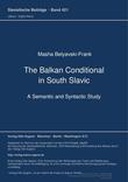Explore

The Balkan Conditional in South Slavic
0 Ungluers have
Faved this Work
Login to Fave
This study examines the morphological and semantic development of the modal construction formed with either the imperfect of 'to want' (Croatian/Serbian) plus the infinitive, or with a modal particle from 'to want' (Macedonian) plus the imperfect of the main verb. The Balkan conditional is analyzed using material from diverse sources, including epic folk poetry, dialectal texts, and the standard literary language in the South Slavic languages, as well as in the Balkan non-Slavic languages of Greek, Albanian, Daco-Rumanian, Istro-Rumanian, and Arumanian. Specific syntactic and semantic contexts are analyzed, and the Balkan conditional is compared to other modal constructions in these languages. One of the characteristic analytic verbal forms shared by the languages of the Balkan league is the Balkan conditional or the so-called 'future-in-the-past'. In the majority of these languages, the Balkan conditional has the status of a grammatical category, whose invariant components are 'modality', specifically 'potentiality', and 'reference to past tense'. With such components, these expressions most frequently and naturally refer to actions which did not take place, i.e., the past, contrary-to-fact conditional.
This book is included in DOAB.
Why read this book? Have your say.
You must be logged in to comment.
Rights Information
Are you the author or publisher of this work? If so, you can claim it as yours by registering as an Unglue.it rights holder.Downloads
This work has been downloaded 247 times via unglue.it ebook links.
- 176 - pdf (CC BY) at OAPEN Library.
Keywords
- analytic verbal forms
- balkan
- Belyavski
- bulgarian balkan conditonal
- Conditional
- Conditionals
- Frank
- Gallipoli and Toriak dialects
- Language
- macedonian balkan conditional
- Semantic
- Slavic
- Slavic languages, Southern
- slavic modal system
- South
- Southern Slavic languages
- Study
- Syntactic
- thema EDItEUR::C Language and Linguistics
Links
DOI: 10.3726/b12699Editions

